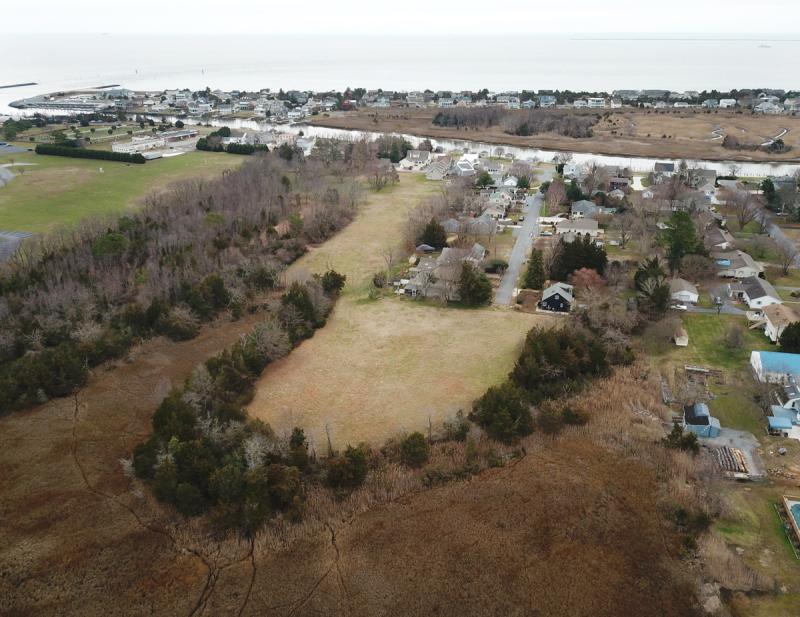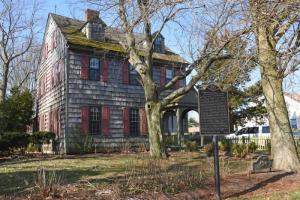The Lewes Planning Commission voted 8-1 Nov. 14 to recommend denial of the proposed Fisher's Cove major subdivision off Rodney Avenue, near the Great Marsh and Canary Creek. Mayor and city council will make the final decision in the coming months.
Commissioner Tom Panetta said the plan had two major flaws – stormwater management and access. He said developer Burke and Rutecki LLC did not demonstrate that the proposed stormwater management plan could actually function without increasing flooding on adjacent properties.
As far as access to the property, he said, Rodney Avenue is not adequate.
“Widening this road will impact the property values of approximately 16 homes located on the road and greatly reduce the house setback, reduce off-street parking and increase traffic,” he said.
The developer is seeking approval for 18 single-family homes on about 11 acres near the University of Delaware College of Earth, Ocean and Environment. Rodney Avenue residents have protested the application from the start, saying their quiet street and quality of life would be forever changed if the city allowed the developer to use their street as access to the development.
Residents called on the commission to require primary access via Pilottown Road next to the historic Fisher House.
The developer included the historic Fisher House on Pilottown Road in the original plan submitted in December 2018, but removed the property when the plan was revised and resubmitted in March. The current version of the plan still includes an easement from Fisher's Cove to Pilottown Road for a pedestrian walkway.
While reviewing possible conditions for preliminary approval Nov. 14, the planning commission agreed access should be via Pilottown Road, not Rodney Avenue.
Commissioner Sumner Crosby raised concerns about sea-level rise and the potential flooding problems that Fisher's Cove residents could face in the future.
He said revisions to the original plan and subsequent alternatives for stormwater management presented at the public hearing in August created challenges.
“It’s been very difficult to follow all of the different permutations of this,” he said. “There seem to be a lot of attempts at pushing the boundaries of our ordinances and trying to get everything to fit on this very difficult site.”
Chair Drew McKay agreed.
“I think the applicant recognized the difficulty of this application by submitting modifications and changes throughout the process,” he said. “I give the applicant credit for trying to come up with a solution, but I don’t think they made a passing grade.”
Commissioner Joe Hoechner cast the lone vote in favor of the project. He said the commission’s list of more than three dozen conditions, which the group discussed at length prior to voting, would result in a code-compliant plan.
“We’re presenting the applicant with a challenge, and they can come back with a final plan that’s drastically changed,” he said. “I would like to see the final product.”
The recommendation will be forwarded to mayor and city council. City Manager Ann Marie Townshend said she expects council to accept the report at its Monday, Dec. 9 regular meeting, but make their decision at a subsequent meeting.
Developer calls foul
Following the meeting, representatives of developer Burke & Rutecki LLC disputed the planning commission’s recommendation for denial.
“We submitted a code-compliant plan,” said Tim Tice of Burke & Rutecki LLC. “This fact has been confirmed in writing by our engineers, and reviewed by our legal counsel. Unfortunately, the planning commission ignored the law following private communications with neighbors who oppose our project. Such private communications were in direct violation of the planning commission’s own rules, confirming the commission’s bias against our project. Thus, we will be seeking approval of our code-compliant plan before city council, and ask them to simply follow the law – nothing more.”
The developer says Commissioner Tom Panetta discussed the application with neighbors outside a meeting setting, tried to influence city staff’s review of the application and has a bias against the project.
In an Oct. 16, 2018, email provided to the Cape Gazette, Panetta asks Planning Commission Chair Drew McKay if Fisher's Cove had been pulled from that night’s agenda. Panetta said he heard that it had from Janice Pinto, a Rodney Avenue resident and strong opponent of the application. The developer says the email shows Panetta was speaking to the public about a pending application, which is against the commission’s bylaws.
In a April 1 email, Panetta suggests city planner Tom West should send a city representative to the Sussex County Conservation District review of Fisher's Cove “to influence their review.” That drew the attention of the developer who says it shows bias against the plan.
Panetta declined to comment on the allegations Nov. 18, saying he and his colleagues made their recommendation on the revised application based on public record and how the application aligns with city code.
Panetta previously addressed the allegations prior to the Aug. 21 public hearing on Fisher's Cove. He said his concerns with Fisher's Cove and all other development include flood hazards; traffic, bike and pedestrian safety; and the development not becoming a burden on the city in the future.
“At no time have I ever expressed or felt a bias against this specific developer or unduly influenced staff or an outside agency,” he said.
The developer is also concerned about road access to the property. Prior to voting to recommend denial, the planning commission built a list of conditions the developer would have to meet in order to gain final approval. One of the conditions would require the developer to create a new road from Pilottown Road as the primary access to the community.
The developer argues a 50-foot-wide public right of way already exists on Rodney Avenue, which dead ends at the Fisher's Cove property. Also, the new road would have to be built on a property no longer part of the Fisher's Cove proposal. While a separate parcel, the property in question is also owned by the developers. They also argue there isn’t sufficient frontage on Pilottown Road to build a road to city standards without harming the neighboring Fisher House.
“It is undisputed that the Fisher's Cove parcel is landlocked other than the access on Rodney Avenue,” said Jon Horner, counsel for Burke & Rutecki LLC. “The planning commission, rather than allowing us to use the public road where Fisher's Cove has legal and deeded access, prefers we go to the property through an adjacent parcel. Doing so is not only legally wrong, but also legally impossible and would lead to the relocation and/or destruction of the historic Fisher House.”
The Lewes code requires 125 feet of frontage on Pilottown Road to create an entrance compliant with the laws, Horner said. He said there is not enough frontage for that to happen.
The developer also raised issue with Commissioner Melanie Moser, who sent an email to the city planner Feb. 7 sharing concerns about deforestation, grading and the location of an interior road. She ends the email by saying she hopes her comments can contribute to an improved proposal.
Moser was appointed to the commission by mayor and city council Feb. 11, and the developers allege the email shows she pre-judged the application and should’ve recused.
In a Sept. 24 email, City Solicitor Glenn Mandalas told the developers the claim was without merit.
“It is apparent to me that you have overstated the gravity of Ms. Moser’s correspondence, as nothing she included within the correspondence suggests she has pre-determined that the application should be approved or denied,” he wrote.
Mandalas declined to comment Nov. 18 on the developer’s most recent claims.
“We are focused on moving the application to city council for its consideration,” he said. “Engaging in a dialogue about ancillary allegations would be a distraction not helpful to city council’s consideration of the application.”















































